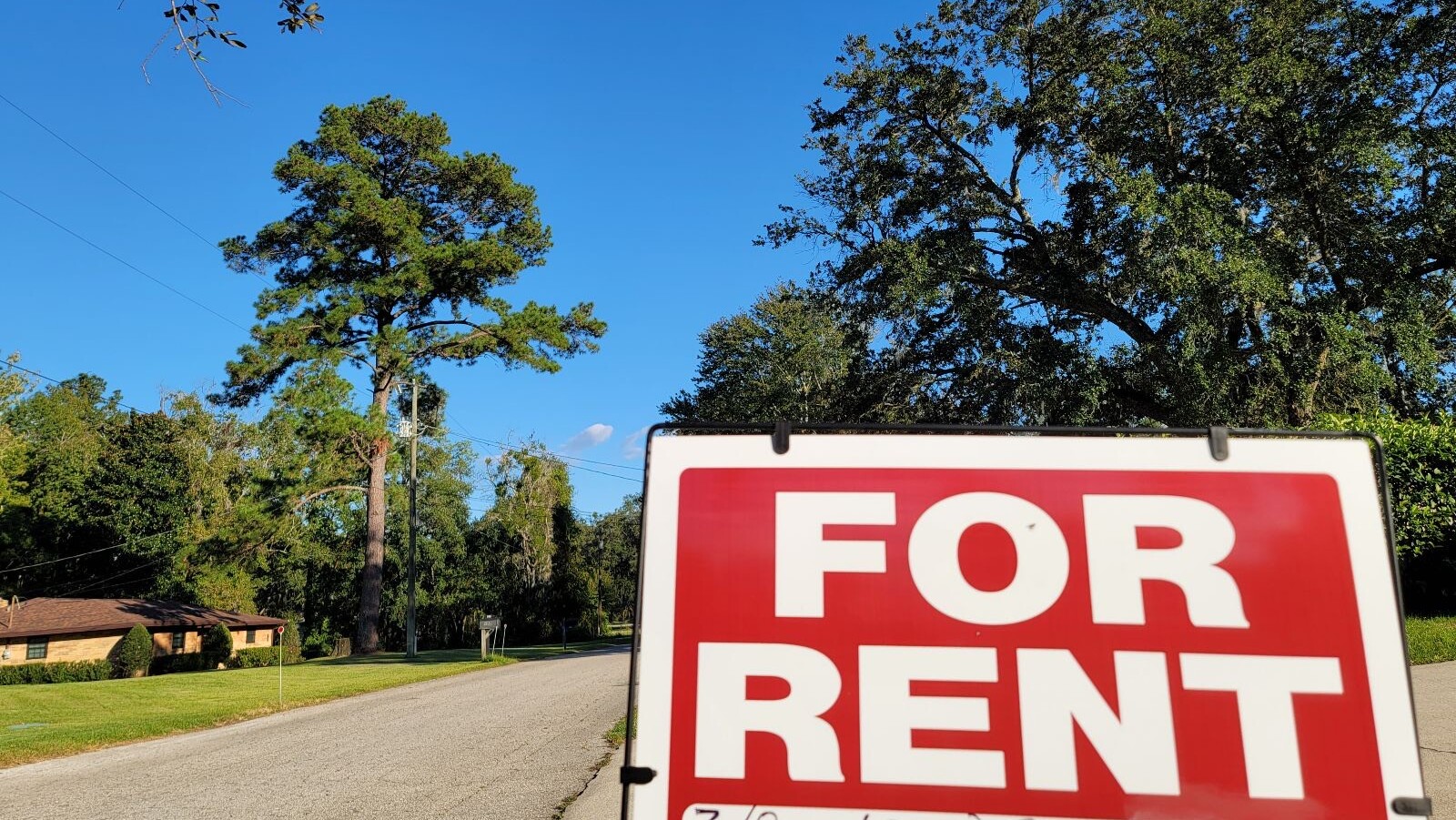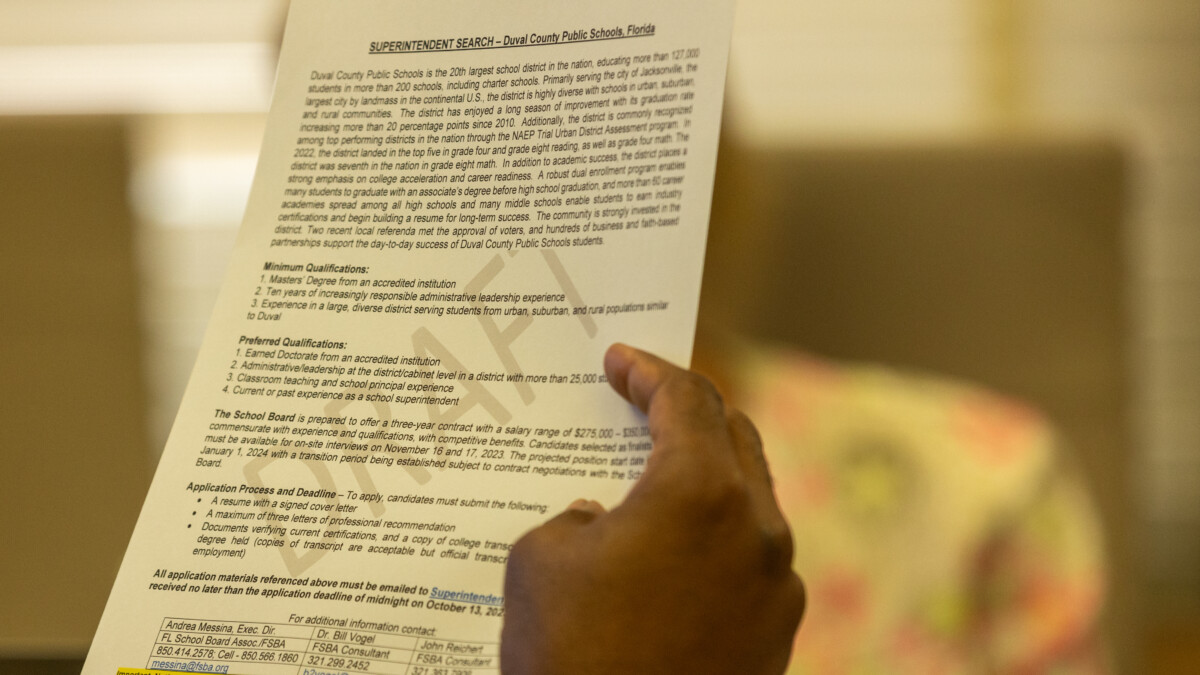Evictions in Duval County are on track to exceed 14,000 court filings this year. And once that legal notice hits the court system, tenants’ options are dramatically limited.
In this second part in our series on evictions, Jacksonville Today looks at trends leading to the increase in evictions, as well as how state eviction law is working against tenants when an eviction notice is filed.
_________
Local rental-aid and social service organizations are seeing worrying trends as the number of eviction notices climbs in the Duval County court system.
For one, they say, people are signing up for leases they clearly cannot afford.
Candyce Breidert, president of the Society of St. Vincent de Paul Oceanside District Council, says the local branch of the organization has seven volunteers that serve as case workers for its rent-assistance program, fielding several calls for help per week.
“Lately it’s been worse,” Breidert says. The volunteers have noticed a trend.
“We’re seeing some of the newer… apartment complexes are allowing people to come in that don’t even qualify (to pay the initial rent),” says Breidert. “You know, a $2,000, $1,500 apartment is a lot of money for somebody that doesn’t have a job.”
Breidert says just four years ago, there was no way someone could sign a lease on an apartment without a job, but based on what she’s seen lately, that’s changed.
“We’re seeing more and more that they’re letting them in and then, boom,” she says. “Some of them are going one month now, (before) they’re putting in eviction notices.”
Lori Richards, executive director of the nonprofit Beaches Emergency Assistance Ministry, says her organization is seeing more of a different trend that also could lead to more evictions: More cash-strapped tenants are reupping leases for a new year, knowing it “probably is not a long-term reality for them.”
“When it’s a renewal, you know, it’s a little different,” says Richards. “You can sort of see the handwriting on the wall. You know, how long are they going to be able to keep up with a rent that really exceeds, you know, 40, 50, 60% of their income?”
When the tenant gets behind in rent, the property management company first sends a three-day notice to collect the past-due amount. After the three days are up, that company can legally file an eviction notice with the clerk of court.
Once that occurs, local legal experts say, choices become severely limited.
Limited legal options
When Niki Colton got her eviction notice back in 2022, she froze. The 39-year-old single mother of three knew what the document was, but she was torn on what to do about it.
Colton was behind in rent and she had five days to respond to the eviction summons. She had only two choices at that point, according to the court document: Pay what she owed to her apartment management firm’s attorney or deposit the same amount with the clerk of court to contest the notice.
Colton did not have the funds, so she stayed at the apartment with her children for as long as she could. About a month later, the court delivered a default judgment in favor of her landlord, along with a notice to vacate.
Colton’s reaction — or, inaction — is typical in eviction cases, says Michael McGrath, who is part of the seven-person volunteer team at the Society of St. Vincent de Paul. The worldwide organization that has a chapter in Jacksonville Beach helps provide funding and financial planning to those who are behind in rent payments.
“We sit down and talk with people just like Niki all the time,” McGrath says. “I would say 90- to 95% of our cases are people like Niki who have waited until they’ve already gotten an eviction notice or a third notice from the company, and they’re kind of panicking.”
Generally, McGrath says, the society’s volunteers try to prevent it from getting to that point.
Deadlines much shorter in eviction cases
The court process for evictions in Florida doesn’t follow typical civil case rules or procedures. The time frame to respond to an eviction notice, compared to a typical civil complaint, is much shorter — five days rather than 30. Even if Colton had wanted to challenge her eviction notice, she would still have needed to provide the rent that was due to the Clerk of Court and ask for a legal hearing and, even then, there is no guarantee that Colton would have had a day in court.
“There is no initial hearing or call docket in Florida for eviction cases (unlike small claims cases, or unlike other states), says Mary DeVries, an attorney with Jacksonville Area Legal Aid who works primarily with tenants living in subsidized housing. “First you have to both 1) timely file a response that raises a defense, and you have to 2) deposit rent where required.”
In other words, Colton could have received a hearing in her case only after paying what she owed — but, even then, it wasn’t guaranteed, mainly because not having enough funds for rent isn’t a legitimate legal defense to prevent eviction, attorneys say.
More often than not, attorneys for the landlord request, and receive, a default judgment in favor of their client.
“Most tenants facing eviction due to nonpayment don’t even get to speak to a judge in an eviction case,” Devries says. “A high percentage of eviction cases end in default judgments for possession. Even if a tenant posts the rent into the court registry, there is no law requiring the landlord to let the tenant remain at the property. Many states have ‘pay and stay’ provisions, but Florida doesn’t. The deck is surely stacked against tenants who are unable to pay rent.”
On top of that, legal resources for tenants facing an eviction notice are extremely limited compared to the demand.
Legal aid scarce
Across the state, attorneys volunteer with nonprofit agencies such as Jacksonville Area Legal Aid (JALA) to try to help people stay in their homes. But those pro bono lawyers are few. That means, in Jacksonville, most tenants facing an eviction notice, unable to afford lawyers of their own, must represent themselves.
“We do not have enough lawyers to meet the needs of Duval tenants,” DeVries says. “We have to ensure that we can competently represent the tenants to whom we do offer services.”
In 2022, Colton was one of more than 14,000 tenants who received eviction notices in Duval County. Covering 17 Northeast and North Central Florida counties, JALA’s housing unit has just five full-time attorneys and a few volunteers who tackle a wide range of housing issues — from evictions to housing discrimination and rental maintenance compliance. Last year, DeVries says the combined offices opened 2,313 cases, with 1,980 in Duval.
For the vast majority of tenants who must tackle eviction filings alone, JALA has created self-help pamphlets, information and forms. They include an explainer of the eviction process as well as an overview of tenants’ rights.
A hurdle to future housing
Once an eviction notice is filed, the mere fact that the court document exists can be a hurdle, no matter the outcome.
“Some states let tenants ‘seal’ or ‘expunge’ tenant eviction records, but Florida doesn’t,” Devries says. “Some states also prohibit landlords from using eviction records in rental application decisions, but Florida doesn’t.”
So it remains likely that a future landlord will spot a prior eviction, says Devries.
Consumer reporting agencies create “tenant screening reports” which can include rental and bill paying history, as well as eviction lawsuits. Generally, information about eviction lawsuits can be reported for seven years in credit reports.
The tenant can dispute the information on the report if there is incorrect information or the info is more than seven years old. But even if the tenant comes through an eviction filing having won the suit, sometimes the black mark lingers.
“Unfortunately, and disturbingly, we’ve even started to see landlords deny applications based on the mere filing of an eviction lawsuit,” Devries says.
She says that in rare cases, court records can be made confidential, but an accurate record of eviction does not qualify.
“There aren’t any great options,” Devries says.
Devries says people with a past eviction need to find a landlord willing to look at the circumstances and give them a shot. Some landlords will take into consideration whether the debt was paid after the eviction or whether the tenant entered into a payment plan and is making timely payments. Or they might be swayed by the story of the medical issue or job loss that triggered the eviction, along with a reference letter from the former landlord.
“I have also seen landlords rent to tenants with evictions if they will pay a higher security deposit,” she says.
Richards, with BEAM, says while tenants facing an eviction notice are challenging to help, her organization sometimes will “write a check” to the clerk of court to help quash an eviction proceeding. She says sometimes, however, it has gotten beyond the point where they can help the person remain in their home.
“Our highest priority is people that have received a three-day notice,” says Richards of the warning letter from a landlord that comes just before an eviction notice is filed with the court. “So many people have never been in that boat before. They’re just panicked that the sheriff is coming… to take their stuff to the curb.”
‘People are just so stretched’
Richards’ organization has also been assisting people with utility bills to a significantly higher degree than pre-pandemic.
“I think that people are just so stretched,” she says. “We have been truly blessed that our community has stepped up with funding. Because in order to keep someone in their house, what that payment is now — compared to 2018 or 2019 — is three, four times as much.”
Breidert says it’s nice to move into a new place, but if the family cannot remain there because they don’t make enough money, it becomes “a mess.”
“I mean, an eviction notice, it’s a smear on your credit record,” Breidert says. “Then you can’t go anywhere.”
While the Jacksonville Housing Authority and other Department of Housing and Urban Development-funded apartments are options for those who have an eviction on their record, the Jacksonville waiting list for HUD-sponsored housing is closed, with 147,000 heads of household in queue.
Breidert says her local organization has spent its grants and donations of approximately $22,000 per month trying to aid people who are behind in rent. With an average of $1,500 rent, that’s approximately 14 families per month helped by the society. So, while the group has increased the grants it has received in the last few years, Breidert says, it can only help a small sliver of Duval tenants who live on the eastern side of the St. Johns River.
But Breidert says the case workers help as many people as they can with advice and financial planning, so hopefully tenants can stick it out longer. They also provide each tenant a list of other agencies and organizations who may be able to offer assistance.
Where to find help
These local agencies and organizations provide financial aid to those in need, as long as funding is available. Each organization also accepts donations to help:
- Society of St. Vincent de Paul: 904-246-5240
- Catholic Charities: 904-632-0600; info@ccbjax.org
- Beaches Emergency Assistance Ministry: 904-241-2326; help@jaxbeam.org
- Downtown Ecumenical Services: 904-358-7955
- United Way Referral Service for Jewish Family and Community Services: 2-1-1
- Beaches Habitat for Humanity: 904-241-1222
- Northeast Florida Community Action Agency: 904-362-8052
- United Way Rental Assistance Directory
In Jacksonville Today’s next article in a series on evictions, we will take a look at city efforts to help tenants. Previously: With Duval evictions on the rise, the evicted often face a more pricey path forward.







